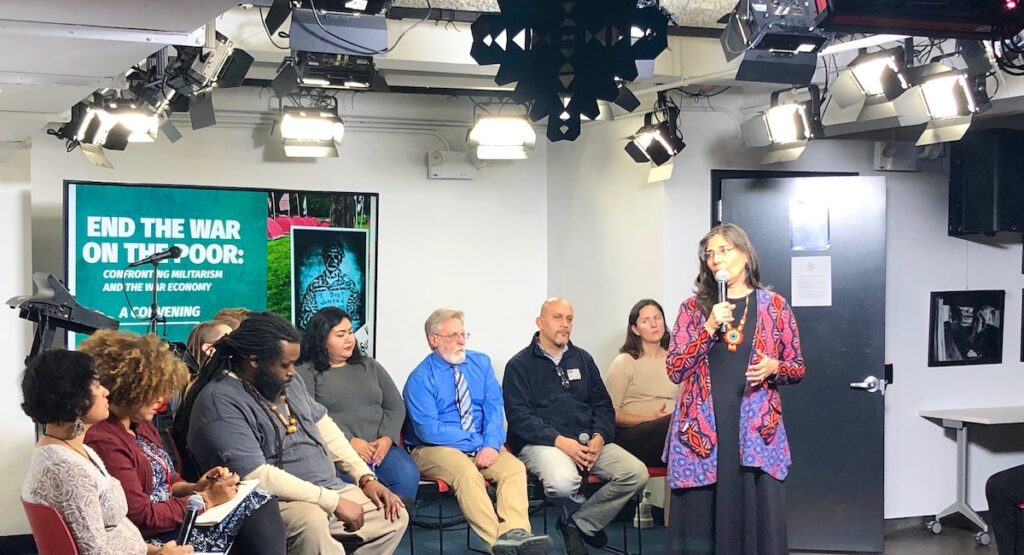
By Trini Rodriguez (Tlazohteotl)
We are warriors.
This is a message expressed often by Indigenous Peoples in and beyond U.S. borders. Why is that? What does it mean? And how is it different from a militarized concept of what a warrior is?
This message was affirmed during a recent visit to Mexico in which I, along with others of Indigenous descent, learned from traditional healers, male and female, all masters at using ancestral science and arts to remain connected to their full capacities as human beings and help others to do the same.
Each, through their inherent gifts and various disciplines, revealed how traditional knowledge has been practiced for thousands of years to ensure internal balance and achieve harmony in the world. They demonstrated the role of such things as medicinal plants, sweat baths, nutrition, the Mexica Sun Stone calendar count, songs, and prayers for achieving wellness. These modalities are infused with ancient wisdoms that help re-center us physically, mentally, emotionally and spiritually. In sharing these and other practices, they stressed an understanding of the duality in everything, both inside and outside of us, and also an appreciation of the principal elements of life — fire, water, wind and earth — to sustain healthy life processes and relationships.
Preserving an Indigenous mindset and lifestyle from one generation to the next requires conscious relational commitment. It requires respect for the relationship of the parts to the whole, of the individual to the group, of the self to the other, of the action to the vision. It requires knowing oneself, your purpose and your place in the world. It requires love and courage to protect these sacred relationships for the sake of everyone and all forms of life. In short, it requires us to be warriors. Warriors with a spirit to protect the People and all that we hold sacred.
Traditional Native Peoples on the North American continent developed entire social and cultural systems rooted in respect for the land, each other and the Spirit in all things. When settler colonizers arrived to these lands with a different mindset, goals and religion, they set in motion the destruction of Indigenous Peoples and their Indigenous social-cultural systems. In effect, what we have experienced is systemic policy violence.
As a result, our past and present is littered with broken treaties and hollow promises of equality and inclusion. Too often, our broken connections to our lands, traditions and elders have left us lost, with no sense of home and belonging. Our ancestral knowledge is disrespected. We struggle to be centered. After centuries of militarized abuse, many of us cannot trace our Indigenous tribal lineage. We are marginalized in our own historical lands. Material poverty is common for us. Racist trauma and ecological neglect know us well.
Clearly, Indigenous Peoples were the first impacted by the four evils the Poor People’s Campaign: A National Call for Moral Revival now sets out to end: systemic racism, poverty, ecological devastation, the war economy/militarism and the distorted moral narrative of religious nationalism.
“Clearly, Indigenous Peoples were the first impacted by the four evils the Poor People’s Campaign: A National Call for Moral Revival now sets out to end.”
In spite of the blatant disrespect of Indigenous Peoples by the U.S. government, Indigenous warriors have stepped up, in disproportionately large numbers, to serve heroically in U.S. wars. I have asked Indigenous veteran relatives why they enlisted and basically they say, “To defend our MotherLand and to protect democracy for the next generations.”
Has our warrior spirit been taken advantage of by the distorted U.S. culture of militarism? I would say yes. The militarism that relies on destruction, force and imposed control does not honor the true protector spirit of a warrior.
Now more than ever, we need warriors of all genders who know their inherent gifts and whose energies and capacities are centered so they can contribute to ensuring the health and wellbeing of generations to come. To me, this means fighting to put back into place relational values and systems that honor the Indigenous knowledge that brutal militarism and the war economy have tried to bury and knock out of us all.
May we remember that we are warriors. May we tap into our resilience to be authors of our own destinies. May we gather ourselves for the battle of our time. May we gain harmony, respect, beauty and abundance for us all.